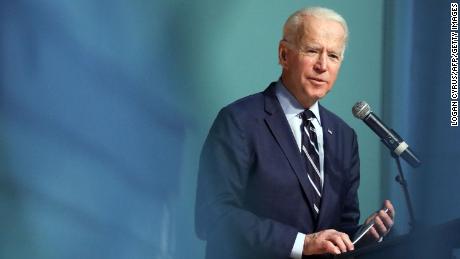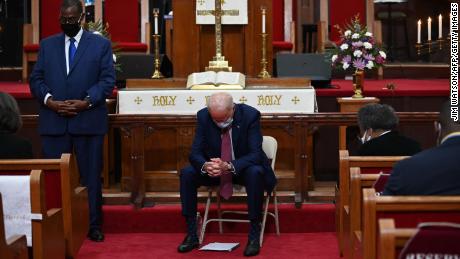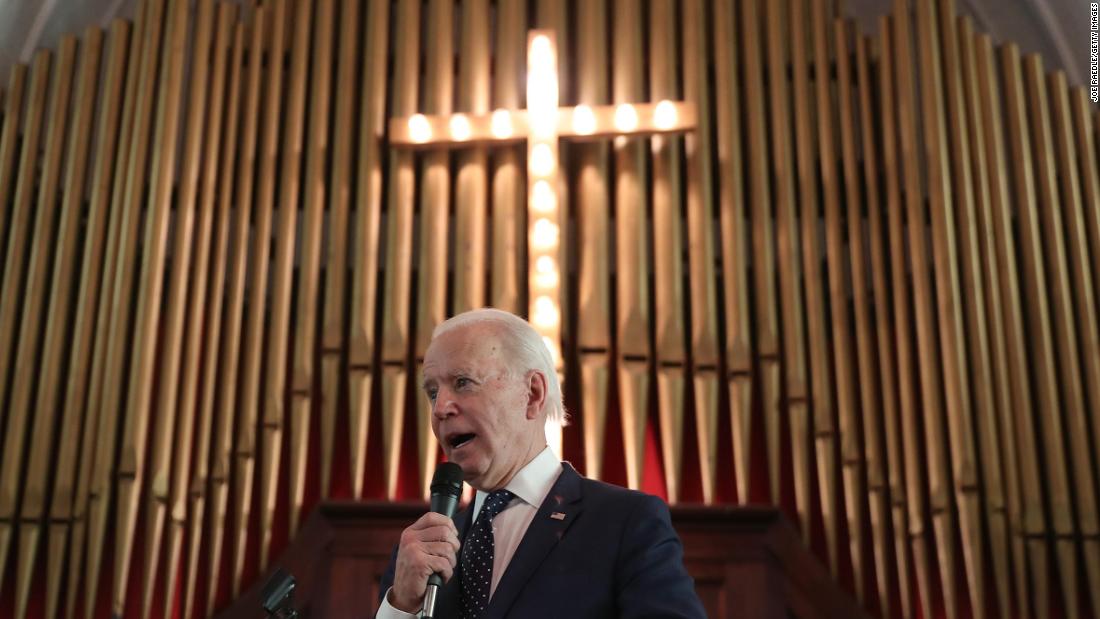Joe Biden is a man of faith. That could help him win over some white evangelicals.
When Biden took the podium to speak, following a particularly charismatic preacher, he joked that it’d be a hard act to follow. “As we say in my church,” he said, showing the sign of the cross, “Bless me father, I need some help.'”
“I think his own faith and values narrative allows us to have inroads into these communities in ways that Democrats might previously not have been able to do,” said John McCarthy, the Biden campaign’s deputy political director who works on Christian outreach.
The Biden campaign is in the early stages of developing its faith outreach efforts for the general election, including holding phone calls and small virtual events with women suburban evangelicals and millennial evangelical pastors.
Michael Wear, who directed faith outreach for President Barack Obama’s 2012 reelection campaign, said he would be “shocked” if Trump loses the evangelical vote but warned of its importance: “If Joe Biden gets 23% or higher of the White evangelical vote, he wins this election.”
Campaign organizing efforts


Biden addresses the crowd during the Rev. Al Sharpton Minister’s Breakfast at Mt. Moriah Missionary Baptist Church in North Charleston, South Carolina on February 26, 2020.
During the Democratic primary, Biden spent more than a dozen Sunday mornings on church visits, mostly to African Methodist Episcopal places of worship in states like South Carolina, Nevada and Iowa. The campaign hired a faith outreach director specifically designated to South Carolina, the state that boosted him toward the Democratic nomination. They also pointed outreach efforts toward a contingency of nuns in Dubuque, Iowa.
But with the early states behind it and the general election in sight, the campaign is now looking to bring in to other religious demographics that may not have been voting for Democrats in the primaries. Among that group: White evangelicals.
The campaign sees a possible opening with White evangelical women, who champion the climate crisis issue, and millennial evangelicals, many of whom are taking on more liberal social views than the elder generation of Christians. The campaign has held calls with these two key groups, providing a space for prayer while also sharing updates and listening to the community’s suggestions and needs.
Its new umbrella term for all faith outreach is called “Believers for Biden,” which features a strong nod to the evangelical vernacular. Outside the campaign, some religious-focused grassroots groups backing Biden have started to crop up.
One such grassroots group, called “Christians for Biden,” was started by Zak McGaugh, a University of California, Davis student in his fourth year who is focused on engaging young Christians to rally behind Biden.
“The ‘battle for the soul of America’ is a theological statement,” McGaugh said. “We want moral leadership and just policies, and both of those things are contrasted with the Trump administration.”
At its core, though, the campaign believes that the best faith outreach centers on the candidate himself.
“The best thing that we have on our side for Catholic outreach is Joe Biden. If you’re looking at the persuadable Catholic voters and the Pennsylvanias, Ohios and Wisconsins of the world, many of these people came up through Catholic education systems, which obviously are huge in Pennsylvania and Ohio and many of them grew up socially around the church,” said McCarthy.
McCarthy, who worked on Christian faith outreach for Hillary Clinton’s campaign, says that the Biden campaign is doing more outreach to the demographic than Clinton did in 2016.
A digital ad released last week that will play in battleground states introduces Biden as a leader of faith, drawing an implicit contrast with Trump without naming him. A female voice narrates the ad, called ‘That’s Joe,’ over still pictures and videos of Biden praying, greeting people, and wearing a mask. “In a crisis, it’s character that counts. We need a president who leads with faith, not fear,” she says, in part.
And as the President stokes division on racial issues to a nation still grappling with the effects of a global pandemic, Biden’s counterprogramming message has been framed squarely on empathy and unity. After Trump cleared protestors in front of the White House using gas and rubber bullets to take a photo with a Bible in front of St. John’s Episcopal Church, Biden condemned the action, accusing the President of being “more interested in power than in principle.”
“When peaceful protesters are dispersed by the order of the president from the doorstep of the people’s house, the White House — using tear gas and flash grenades — in order to stage a photo op at a noble church, we can be forgiven for believing that the president is more interested in power than in principle,” Biden said.
Some Christian leaders spoke out against the photo-op, accusing the President of using the church and the bible ‘for partisan political purposes,’ while other White evangelical preachers praised the President’s action.
Still, Biden needs to do more to secure a steady segment of the White religious vote.
“There needs to be a couple big moments. Biden needs to give at least one explicit speech where he specifically asks for their votes and lays out a case,” said Wear.
Austin Ruse, author of “The Catholic Case for Trump,” told CNN that he believes it will be a close vote between Trump and Biden, but ultimately that the President will win both what he calls “faithful” Catholics, those who actively practice the faith, and the “generic” Catholics, who identify with the religion but may not practice. Ruse believes Trump, who is not Catholic, “has done more on the life issues than any president in our history. He more closely adheres to Catholic social teaching than Joe Biden.”
“Yes, there’s been a little softening and evangelical support just a little bit, but that’s temporary,” he told Lou Dobbs. But Jeffress believes that when evangelical voters compare Trump’s “solid accomplishments in the pro-life, pro-religious liberty, pro-Israel, pro-conservative judiciary arenas,” to Biden’s “absolute commitment to undo every one of those accomplishments,” they will turn out to vote for Trump.
Biden’s expression of faith


Biden prays as he meets religious leaders at Bethel AME Church in Wilmington, Delaware, on June 1, 2020.
Biden grew up in a multigenerational Catholic home, where he says he learned the foundational principles of politics. He devotes the very first pages of his memoir, Promises to Keep, to illustrating his Catholic identity, noting that he spent every Sunday at mass where his attendance “was not optional.”
“The entire Finnegan clan rode over to Saint Paul’s Catholic Church together,” he writes, “and church always felt like an extension of home.” Biden writes that as a child, he’d worked through tough questions like “Who is God” and “What do we mean when we say that God is all good?”
Delaware Sen. Chris Coons, a Biden campaign surrogate and close friend to the former vice president who graduated from Yale Divinity School before running for office, described the presumptive Democratic nominee’s faith to CNN as personal and genuine.
While serving as vice president, Biden would unassumingly slip into the back of St. Patrick’s Parish in Wilmington, Delaware, to pray.
“I remember on several occasions glancing back and seeing him, just praying with that intensity, like he’s physically trying to pray as hard as any human has ever prayed in history, working his rosary beads, kneeling. And I knew later that he was praying for Beau,” Coons, who has participated in some of these Believers for Biden calls, recalled.
Biden’s life has been marred by personal tragedy, losing his first wife and daughter in a car accident and, later, his son Beau to cancer. The former vice president, who regularly wears his late son’s rosary on his wrist, has publicly spoken about the role his faith has played in carrying him through grief.
“It took a long time to get to the point to realize that that purpose is the thing that would save me,” Biden said. “And it has.”
The way he has dealt with his grief has long been an expression of his faith.
“For the word of the Lord is right; and all His works are done with faithfulness,” he quoted in his 2007 memoir, eight years before Beau passed away.
Biden’s entire candidacy for president hinges on the promise of America’s redemption: the redemption of its character and the restoration of its soul. But Biden also has sought redemption, a fundamental tenet of Christianity, in his own life after dealing with personal loss.
In the summer of 2015, just months after Beau’s death, Christopher Hale attended two breakfasts for Catholic leaders hosted by Biden in his official residence in Washington, DC, ahead of Pope Francis’s visit to the capital that fall. Hale, a current Democratic candidate for Congress in rural Tennessee and former Obama faith adviser, says he handed then-vice president Biden a letter asking him to run for president of the United States.
According to Hale, at the second breakfast meeting a few weeks later, Biden approached him, telling him he’d read his letter. “He said, ‘I’m not sure what I’m gonna do. I’ve relearned in old age what the nuns taught you and me as kids, Christopher — love without suffering isn’t real,” Hale recalls. “He told me that his family is suffering a ‘helluva lot’ right now and he wasn’t sure if he’d run. But he said, ‘I know redeeming Beau’s death is gonna define the rest of my life.'”
“This is a man who knows what it means to both be on your knees in prayer and to be shouting with joy in a congregation in South Carolina, that is also desperately yearning for God’s grace but is celebrating in a way that’s just so open-hearted,” Coons explained.
Coons is confident that Biden’s message will translate naturally to religious voters.
“I think there’s millions of White Catholics and White evangelicals who can look at Joe Biden and say, ‘This is a man whose life has been touched by grace, who has been sustained through faith, and who respects me,” he said. “Yeah, we may not agree on every application of a gospel to doctrine and doctrine to policy, but I know this is a guy who knows the words to hymns, who knows passages from the Bible, who respects other faiths, and for whom the very idea of faith is central to who he is.”
![]()




